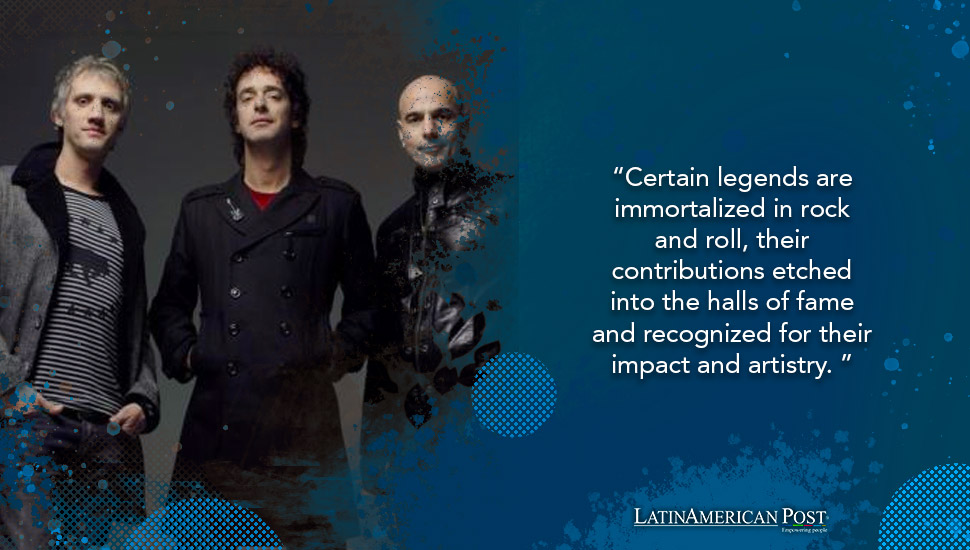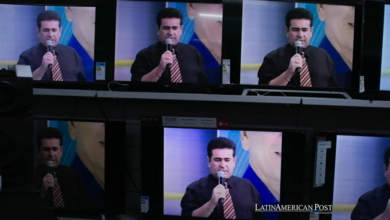The Case for Soda Stereo and Other Rock en Español Bands in the Rock & Roll Hall of Fame

Ten years after Gustavo Cerati’s death, fans call for Soda Stereo’s induction into the Rock & Roll Hall of Fame. With no Spanish-language rock band ever inducted, the campaign raises questions about the Hall’s inclusivity and global representation.
Certain legends are immortalized in rock and roll, their contributions etched into the halls of fame and recognized for their impact and artistry. Yet, despite rock being a global phenomenon, the Rock & Roll Hall of Fame has been slow to acknowledge bands that sing in languages other than English. One glaring omission is Argentina’s Soda Stereo, a band that revolutionized Latin American rock and garnered a massive following yet still awaits its place among rock’s most significant.
Since its formation in 1982, Soda Stereo has become a beacon for the Spanish-speaking world, blending rock with elements of new wave, post-punk, and pop. Led by the late Gustavo Cerati, the trio redefined what it meant to be a rock star in Latin America. Their music transcended borders, with songs like De Música Ligera becoming anthems for generations of Spanish speakers.
However, as of 2023, no Spanish-language band has ever been inducted into the Rock & Roll Hall of Fame. Of nearly 1,000 inductees, only a handful of Hispanic musicians—mostly U.S.-born or English-language artists like Carlos Santana—have made it in. This has renewed calls for more excellent representation, with Soda Stereo at the forefront of the conversation.
The Case for Soda Stereo
The campaign for Soda Stereo’s induction has been gaining momentum, especially after Cerati’s passing in 2014, which left a void in the hearts of fans across the globe. Cirque du Soleil honored the band with Sep7timo Día, a tribute show that joined an exclusive club of productions centered around The Beatles, Elvis Presley, and Michael Jackson. This recognition from a world-renowned entertainment group underscores the band’s universal appeal, yet the Rock & Roll Hall of Fame remains silent.
Soda Stereo’s influence cannot be overstated. They were pioneers of rock en español, alongside other legendary bands like Héroes del Silencio from Spain, whose potent lyrics and musicality paved the way for the genre. Like Soda Stereo, Héroes del Silencio has amassed a loyal following, with their albums becoming iconic representations of Spanish rock.
As the campaign for Soda Stereo continues, advocates argue that their omission is not due to a lack of talent or influence but rather a lack of exposure. The Hall’s nominating committee, composed of 30 experts, has no Hispanic representation, leaving a blind spot for the rock movements in Latin America and Spain. This disparity highlights the need for more inclusive decision-making in the music industry’s most prestigious institutions.
Other Icons of Rock en Español
While Soda Stereo takes center stage in the campaign, they are far from the only band deserving recognition. The rock en español movement spans decades and countries, with several bands contributing to its development and popularity.
El Tri, a legendary Mexican rock band, has been a pillar of the genre for over 50 years. Led by Alex Lora, El Tri became a voice for social and political issues in Mexico, with songs like Virgen Morena resonating deeply with religious and secular audiences alike. Their longevity and continued relevance make them worthy contenders for international recognition.
El Cuarteto de Nos has been crafting intricate and witty songs in Uruguay for over two decades. Despite their fame arriving relatively late in their career, they have become a staple of the rock scene in their home country. The band’s blend of humor, social commentary, and catchy melodies has earned them a loyal fanbase across Latin America.
Chile’s Los Prisioneros brought a new wave of rock with a strong political message. Their songs, like Tren al Sur and Estrechez de Corazón, became anthems of social resistance, particularly during Chile’s dictatorship. The band’s ability to blend pop-rock sounds with powerful messages about inequality and oppression set them apart as pioneers of socially conscious music in the region.
From Mexico, Café Tacvba emerged in the early 1990s as a groundbreaking group that fused rock with traditional Mexican music. Their hit La Ingrata became a cultural phenomenon known by many in Mexico and beyond. The band’s experimentation with different genres and sounds makes them a key player in the evolution of Latin American rock.
Charly García and the Argentine Rock Revolution
No discussion of rock en español would be complete without mentioning the incomparable Charly García, who, along with Luis Alberto Spinetta, is considered the backbone of Argentine rock. García’s band Sui Generis is one of the many projects that propelled him to stardom. Known for his protest songs during Argentina’s military dictatorship, García became a voice of resistance and hope.
His influence didn’t stop with Sui Generis. Bands like Pescado Rabioso, another Spinetta project, continued the Argentine tradition of introspective, poetic rock that has endured for decades. These bands have shaped the sound of Argentine rock and inspired generations of musicians across Latin America.
Breaking the Language Barrier
The Rock & Roll Hall of Fame has long been seen as a bastion of English-language rock, but music is a universal language that transcends borders. If the Hall aims to honor those who have shaped the genre, it must recognize that rock has thrived in many languages, not just English.
Bands like Caifanes, Hombres G, and Aterciopelados have shown that rock en español is not a regional anomaly but a global movement. These bands have played in sold-out arenas, headlined festivals and influenced countless artists just as much as their English-speaking counterparts.
Caifanes, in particular, became a Mexican rock institution, with hits like La Negra Tomasa cementing their place in the country’s musical history. The band’s ability to blend rock with Mexican folk traditions gave them a unique sound that resonated with fans across the Spanish-speaking world.
In Colombia, Aterciopelados showed that there was room for rock, even in a country dominated by Vallenato and Cumbia. Their constant evolution and reinvention have made them one of the most innovative bands in the region.
Towards a More Inclusive Hall of Fame
As the world becomes more connected, institutions like the Rock & Roll Hall of Fame must reflect the diversity of the global music scene. The omission of Soda Stereo and other rock en español icons is not just an oversight—it is a missed opportunity to honor the contributions of musicians from different cultures who have shaped the sound of rock music.
The case for Soda Stereo’s induction is not about meeting diversity quotas but acknowledging the profound impact Spanish-language rock has had on millions of fans. Like many of its contemporaries, Soda Stereo transcends language barriers.
Also read: Key Latin America Issues for the Next U.S. President to Address
The time has come for the Rock & Roll Hall of Fame to expand its horizons and recognize that rock music is more than just an American or English-speaking phenomenon. By inducting Soda Stereo, the Hall of Fame can take the first step towards creating a more inclusive and global Hall of Fame that genuinely honors the universal power of rock and roll.





